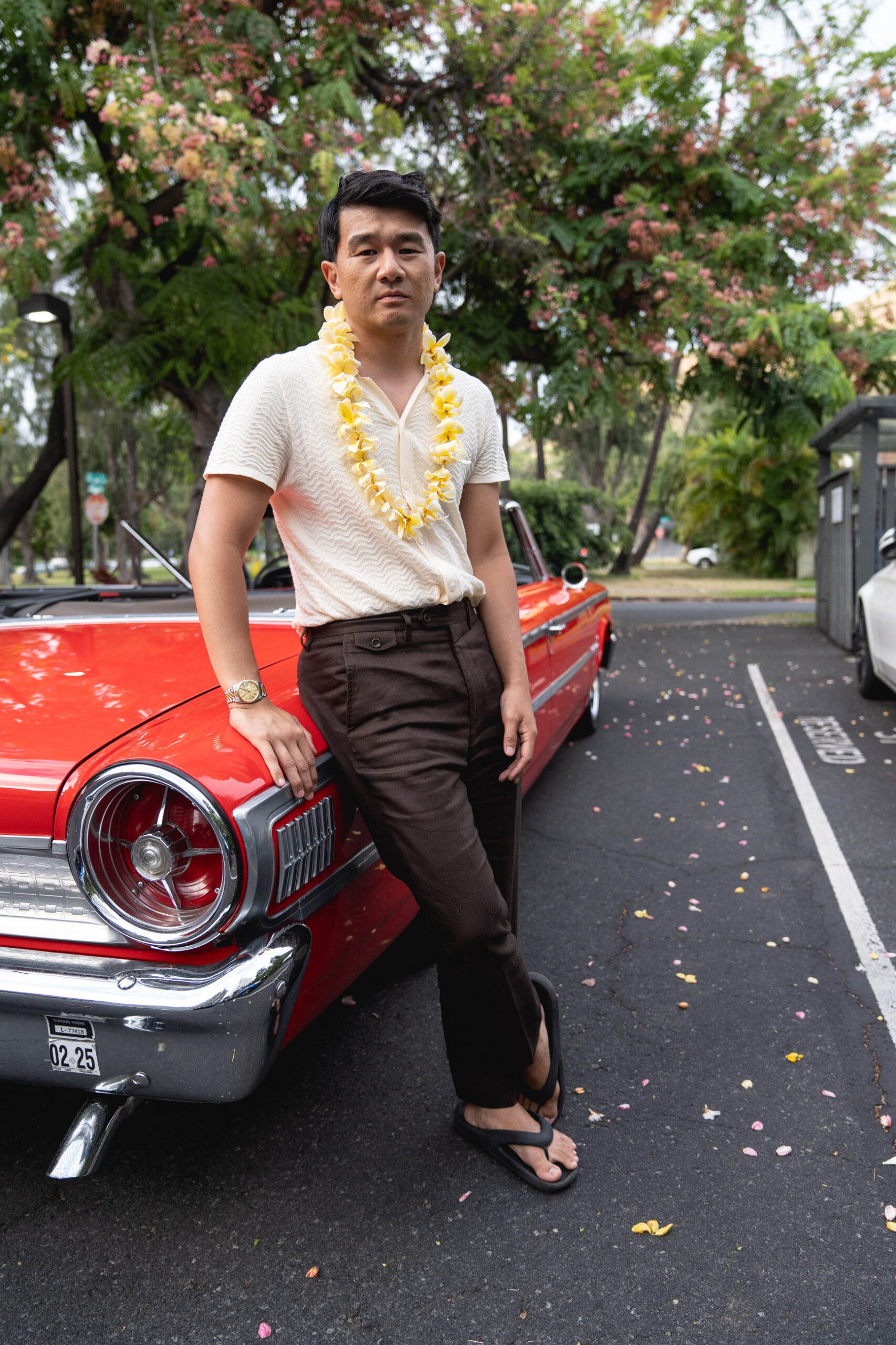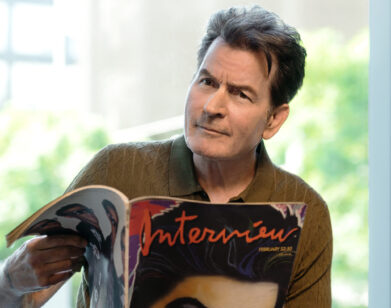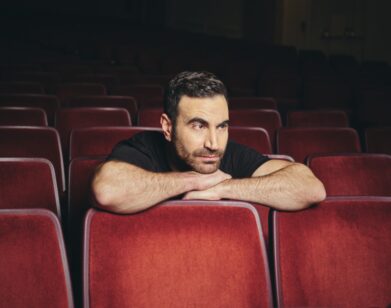JUST FOR LAUGHS
Ronny Chieng Gets an Introduction to the Tao of Jerry Seinfeld
As a young boy growing up between Singapore and Manchester, New Hampshire, Ronny Chieng first learned English by watching the stand-up comedy intervals on Seinfeld. So when Jerry Seinfeld himself logged onto Zoom last month to interview the comedian before the release of his third Netflix special, Love to Hate It, it was a full-circle moment for Chieng, who couldn’t quite believe his hero had agreed to take part. “It’s something about you,” Seinfeld exclaimed. “You’ve got that thing.” But while gushing about Chieng’s meteoric rise to the top of the comedy mountaintop, which included a starring role in Hulu’s Interior Chinatown last month, the maestro did have one particular bone to pick with his young protégé about his liberal use of profanity. “This is my personal opinion,” Seinfeld said. “Please feel free to reject it.” Below, the comedians trade insights on swear words, the function of stand-up in a changing entertainment industry, and why going on a late-night show always makes them sick for at least 24 hours.
———
RONNY CHIENG: Mr. Seinfeld.
JERRY SEINFELD: I haven’t done enough for Ronny Chieng.
CHIENG: I’m surprised you agreed to do this.
SEINFELD: You know, it’s something about you. You just want to say yes. You’ve got that thing.
CHIENG: Thank you.
SEINFELD: I have it too, you know. [Laughs] How are you doing?
CHIENG: I’m okay. I’m actually in L.A. I just did Kimmel. I heard you did Fallon last night.
SEINFELD: I did.
CHIENG: Well, they told me how busy you were and how much I should be thankful that you even decided to speak to me. I’m still not over it.
SEINFELD: I think it’s time.
CHIENG: But it’s such a weird skill set to have to be a comic on a couch on a late-night show. You know what I mean? It’s its own thing.
SEINFELD: I used to get this thing I would call a 24-hour talk show virus. You do a talk show and no matter how it goes—it could be fantastic, mediocre, whatever—you don’t feel good for 24 hours. Do you have that?
CHIENG: No, I think I probably have the 48-hour one. I get it 24 hours before the interview and then 24 hours after.
SEINFELD: Oh, right.
CHIENG: I’m sick the whole time. You don’t just go on and be sincere. You want to be funny, but you don’t want to just do a set–
SEINFELD: Yeah, I went and did a set and just felt terrible about it. And then I watched you tell a story about the night of the election. And I thought, “That’s what I should have done.” I don’t have any stories, though. I don’t understand these shows. What is going on here? Are we worthless or valuable?
CHIENG: Comedy swings pretty hard. The range is from extremely valuable to extremely worthless in the same day. I think it’s like bitcoin.
SEINFELD: It’s joke to joke, really.
CHIENG: For real. I get my kicks from connecting to people I only know from watching on TV. Comedians, we have a lot of reverence for history. These are institutions that I’m just happy to be able to touch once in a while. That’s why I do it. I’m like, “All my heroes used to do this.” But then I didn’t know if I should do so much press. You were actually the one who told me, “What are you talking about? Do all the press.”
SEINFELD: Absolutely.
CHIENG: So just to be clear, you’re also doing this for press.
SEINFELD: Yes. I love to think back to my early days of doing clubs when I didn’t even ask how many days I worked or how many shows I did. Whatever you told me, it was fine. The club owner would say to me, “I want you to do an extra show.” And I’d go, “An extra show?” And he would say, “What’s the difference? All you do is talk.”
CHIENG: Right.
SEINFELD: I came from that. And now the comedians are like, “Well, we want to know what makes you tick.” I have watched the needle go from zero all the way to the insane place that it is now.
CHIENG: Do you think it’s going to go back to where they don’t care about what makes us tick anymore?
SEINFELD: Yes, I do. We’re in the red zone now. I think tact is going to have to come back, and what will make it come back is aging. When you’re in your fifties, you don’t care about anybody else’s problems.
CHIENG: The thing that irks me is that they don’t actually care what makes you tick. They’re just asking because they’re trying to fill words in a column or keep the interview going. Most people don’t care.
SEINFELD: I have a new line in my set that I just started doing. It’s unbelievably gratifying. It is a long run about what’s annoying in the world. I say, “I find that whenever people talk, it tends to be annoying.” At this point of life, the hardest thing any of us have to do is not scream “I don’t care!” into the face of anyone that says anything. And the audience totally loves it.
CHIENG: Especially in this very outrage-y kind of world, you’re supposed to care about this and care about that. But most people are like, “I don’t care.”
SEINFELD: My daughter is writing comedy and I’m teaching her whatever I can, but the main thing I teach her is, in this life, you must always please the comedy gods. They dislike arrogance and ego. They will smite you if you display too much arrogance, but they will also smite you, quickly and seriously, if you are not bold when the opportunity presents itself. I actually believe in this, and we watch it happen every single day. Any time you watch somebody do a set, the god’s right there to smack them. You don’t question them and you don’t argue with them. You accept their judgments.
CHIENG: And it’s very fragile, as well.
SEINFELD: It is very fragile. So to get back to the point, the needle will swing back. If you don’t supply what they demand, which is laughs, they’ll make you sorry. It’s like a dog and food. Your dog is the most wonderful pet. Stop feeding him, and see how long that lasts. And when you’re older, you’re not cute. You’re very cute now, but another 30 years—
CHIENG: Well, thank you for letting me know that. Your generation created the infrastructure of comedy, and, in many ways, you guys were the pioneers of stand-up comedy. Did you age into a different perspective? Does your audience age with you?
SEINFELD: I’ve seen many comics grow old. I mean, all the guys that I loved in the 60s, they were old. But age is a little different now than it was. In those days, 40 was pretty old. So this comes down, again, to what the comedy gods require. Your love must be pure. Yeah, the money’s great, fame is great. But they’ll catch you at that if you try to pull that crap on them. They’re the gods. They see everything.
CHIENG: All right. Well, it’d be nice if they let me know that.
SEINFELD: Oh, I’m telling you.
CHIENG: Are you trying to convert me to Judaism? Is that what this is?
SEINFELD: Sure. But Jews don’t look for converts. That’s why there’s so few of us. We sell everything else really well, but—
CHIENG: I can see how much love you have for the game, and that’s another thing I admire about you. I feel like you would just keep doing it. Well, you are.
SEINFELD: Oh, totally.
CHIENG: Part of me loving stand-up comedy now is realizing that it’s separate from show business, or Hollywood at least. I used to want Hollywood to give me flowers. I wanted it to be acknowledged that I had a good set or I sold out this venue. But the more I do comedy, the more I’m like, “Oh, I’m glad they don’t know what I just did.” I’m surprised when people know that I do stand-up comedy. I’m genuinely shocked.
SEINFELD: That’s funny. Stand-up comedy is an island off the coast of show business.
CHIENG: But sometimes people try to fold it in. They try to annex it.
SEINFELD: They really have, though. The money we got paid last night versus the money Netflix pays us, it’s connected. I know it’s not amusing or interesting how it happened, but it happened in 2015 when Chris Rock was offered a big chunk of dough to do an election stand-up special, which he couldn’t do. That offer is when everything flipped. Then all of a sudden, for the first time it’s like, “Are we important?”
CHIENG: You didn’t feel that way with the satires? Like John Stewart or—
SEINFELD: No. You were still an exile who was invited in. A side dish that everybody likes, but it’s not important.
CHIENG: But that’s what makes it cool, right? It took me so long to realize that what makes stand-up cool is being the side dish, being outside of it. Like you said in your famous award-winning speech, “We don’t want to win awards. We want to be in the back of the room making fun of people getting awards.”
SEINFELD: I saw that happen, but I would like to talk a little bit about some of the profanity that you use.
CHIENG: Oh, okay.
SEINFELD: What’s your philosophy with that?
CHIENG: I don’t want to rely on it. Are we talking about swear words or just profane premises?
SEINFELD: Profane premises, I don’t mind. And I shouldn’t even be doing this in this interview so that people can hear, but—
CHIENG: Please.
SEINFELD: It is only because your language skills are so exceptional. This is my personal opinion, please feel free to reject it. But the reason we’re paying to see Ronny Chieng is because he talks better than us. Some comedians say, “Well, I like to use words how people talk.” If I want to hear how people talk, I don’t need to pay for that. I can just open the window. It does hit me sometimes, when I see you use certain words. I go, “Ronny could get that same laugh without that word.”
CHIENG: Well, I mean—
SEINFELD: Not because the words are offensive, because they’re not. But because it’s an opportunity for him to demonstrate his superior skill level. That is the reason I bring it up.
CHIENG: I appreciate that. But you’ve given my mother fuel for the rest of her life. She’s been telling me, “You got to be more like Seinfeld. He doesn’t swear.” Now Seinfeld is literally telling me to stop swearing.
SEINFELD: My mother wanted me to have more sexual material.
CHIENG: Are you serious?
SEINFELD: I’m serious. In her eighties and nineties, she would complain, “Why don’t you ever talk about sex?” Isn’t that funny?
CHIENG: The legend, Jerry Seinfeld. I can get behind that. Honestly, if your punchline is swearing, I think that’s when it gets a little lazy. But pushing yourself to not swear at all is a degree of difficulty. Sometimes, the economy of words makes it so that it’s the easiest way to get across a certain emotion. But I hear you.
SEINFELD: We could examine it on videotape if you want.
CHIENG: Let’s watch the tape back. Do you mean stand-up or The Daily Show?
SEINFELD: Either one.
CHIENG: Interesting, okay. I hope this doesn’t come across as super defensive. I’m genuinely discussing the comedy mechanics of this. I think sometimes on The Daily Show, what was funny about swearing is that the premise was to satirize the news. So seeing someone swear when talking about the news on TV, a little bit of the comedy came from that. I think that’s some of what’s going on there with the swearing.
SEINFELD: I will agree with you, especially because you used the phrase “a little bit.” But anyway, this is a style conversation. There’s not too many comedians that even want to talk about style. I just find that fun.
CHIENG: Well, you came up with people who were going quite hard with not only the vulgarity in words, but the premise, the sex and drug talk. You managed to kind of cut through that. Was it a challenge to not talk about it?
SEINFELD: Comedians always and only talk about the things that they can talk funny about. I’m funny when I talk about Frankenstein wearing a sports jacket. That’s what determines all subject choices: it’ll be funny. If politics or sex or drugs made me funny, yeah, I would talk about them.
CHIENG: I went to the Emmys. The warmup was a stand-up comic. The host was a stand-up comic. The writers were comics. Naughty side dish or whatever, we are making this thing run.
SEINFELD: Well, if you look back on the history of the sitcom, a lot of it is stand-up comics. Starting with Jackie Gleason, Jack Benny, Gabe Kaplan. But it’s a tough thing for a stand-up comic to take that persona, put it in a different jar, and make it taste the same.
CHIENG: Also, I feel like there’s more comedians than ever.
SEINFELD: Oh, no question.
CHIENG: We’re going to have a million comedians in their sixties, or people will drop off.
SEINFELD: No, there’ll be six. There were six great comics in 1965, and there’ll be six in 2035. The stand-up comedy ecosystem is the most efficient Darwinian universe. The NFL would be the only comparison. If you’re on the field in the NFL and you don’t belong there, we’re going to find out in seconds.
CHIENG: I’ve got one minute left with you, and I just want to ask you if you’ve got any advice for someone entering his forties as a comic in America.
SEINFELD: You’re not talking about you, are you?
CHIENG: Yeah, I’m talking about me.
SEINFELD: You are well-equipped, my friend. Your bags are packed with the essentials. You’re halfway up Everest already. Just keep doing it.
CHIENG: Thank you. And thanks for showing me what stand-up comedy is so that it was even something I could aspire to do.
SEINFELD: You’re welcome for all of that.







